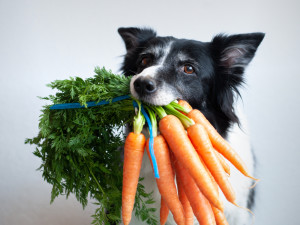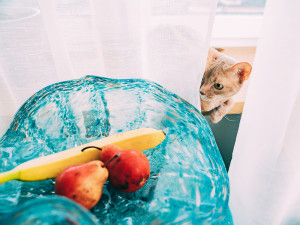Is a Plant-Based Diet Safe for Your Cat or Dog? Experts Weigh In
Curious about a plant-based diet for your pet? Discover what science has to say about it
With the rise of plant-based diets among humans in the UK, many pet parents are questioning whether their cats and dogs can thrive on a vegetarian or vegan diet too. Historically, cats and dogs have been viewed as obligate carnivores and omnivores respectively, leading to scepticism about the feasibility of plant-based diets for them long-term.
Dogs and cats have been domesticated for centuries, but their dietary needs are deeply rooted in their wild ancestors. Dogs, known to be omnivores, are able to derive nutrients from both plant and animal sources, but cats are obligate carnivores, meaning they require certain nutrients found only in meat. However, some studies are now claiming that, with the right balance of supplements and nutrients, both species could adapt to plant-based diets.
With 35 percent of pet parentsopens in new tab now indicating an interest in exploring a plant-based diet for their pet, we take a look at what the science is really saying and ask is it ever OK to feed your dog or cat a vegan diet?
The dietary history of cats and dogs
For centuries, domestic dogs (Canis familiaris) have scavenged and hunted, often consuming a mix of meats, vegetables and grains provided by their human companions (read: butlers). Even in the wild, wolves (Canis lupus), which are ancestors of domestic dogs, primarily hunt and consume prey but also occasionally ingest plant material. Cats, on the other hand, are strict predators in the wild, primarily consuming small mammals, birds and insects.
In recent years, the push towards sustainability and ethical eating has led to an increased interest in plant-based diets for pets. Pet parents are motivated by various factors including environmental concerns, ethical considerations regarding farm animal welfare and personal dietary choices. But the jury is still out on whether a plant-based diet is actually beneficial for your pet.
Can dogs survive on a plant-based diet?
Dogs are omnivores, which means they can digest and utilise nutrients from both animal and plant sources. Recent studies suggest that dogs can indeed thrive on plant-based diets, provided the diet is nutritionally complete and balanced (meaning they’re able to get all the vitamins and minerals that they would otherwise get from meat, from another source). However, just because they can, doesn’t mean they should, and the topic of vegan diets for dogsopens in new tab is still contentious among veterinarians and pet nutrition experts.
What are the benefits of a plant-based dog diet?
According to the Blue Crossopens in new tab, dogs can be fed a vegetarian or vegan diet if it is carefully planned to meet all their nutritional needs. This includes working with a vet to ensure that the protein, vitamins and minerals that are typically sourced from meat are still present and correct in their new diet.
A study highlighted by The Guardian suggests that “vegan diets are healthier and safer for dogs”, emphasising that with proper formulation, dogs could potentially thrive on plant-based diets.The 2022 study, in collaboration with the University of Winchester and published in the journal PLoS One, found that dogs eating vegan dietsopens in new tab had fewer health issues compared to those on conventional meat-based diets. The researchers concluded that “dogs maintained on nutritionally sound vegan diets for a period of six months or more showed no adverse health effects and had significantly better health outcomes in several categories”.
Dr Andrew Knight, a visiting lecturer at the university’s faculty of Health and Wellbeing and leader of the peer-reviewed study, advised that “vegan diets for dogs can be healthful and nutritionally adequate, but they must be properly formulated and regularly monitored”.
However, the study was formed of qualitative research based on the answers of pet parents to questions on certain topics. This means that the results were based on the human readings of their pets, which can be very subjective. As Dr Richard Butterwick, global nutrition advisor at the Waltham Petcare Science Institute points out, “to date, there is no credible peer-reviewed scientific evidence to indicate any health benefits from feeding a dog a vegan diet and no vegan diets are made commercial on a large scale.” Basically, the research is being done, but at this point in time, the scientific community isn’t ready to put their stamp of approval on it.
What are the risks of a plant-based dog diet?
A plant-based diet might be an option for your dog, however, the British Veterinary Association (BVA) cautions that “the jury is still out on vegan dog diets” due to potential nutritional deficiencies if not managed correctly.
A balanced diet for dogs must include proteins, fats, carbohydrates, vitamins and minerals. Essential amino acids such as taurine and L-carnitine, typically found in meat, must be supplemented in a plant-based diet. Moreover, dogs need omega-3 and omega-6 fatty acids, vitamins D and B12, and minerals such as calcium and phosphorus.
The Blue Cross notes that while there are high-quality vegan and vegetarian dog foods available, the risk of nutrient deficienciesopens in new tab, particularly in proteins and essential amino acids like taurine, is a concern that would need to be addressed through supplements or specially formulated foods.
“These requirements are outlined in the feeding guidelines produced by AAFCO (Association of American Feed Control Officialsopens in new tab), NRC (Nutritional Research Councilopens in new tab) and in Europe, FEDIAF (European Pet Food Industry Federationopens in new tab), and ensure safe growth and healthy maintenance of dogs,” says Dr Butterwick. “Given that there are no issues in digesting starch and/or carbohydrates most of those requirements can be met through fruit, vegetables and grains.”
“Meat contains vital vitamins and nutrients needed by cats and dogs,” said former BVA President Dr Justine Shotton in response to the publication of the PLoS One study. “Although we would not recommend itopens in new tab, it is theoretically possible to feed a dog a vegetarian diet, but owners would need to take expert advice to avoid dietary deficiencies and associated disease, as it is much easier to get the balance of nutrients wrong than to get it right. A dog on a vegan diet may also need synthetic supplementation.”
Dr Butterwick reinforces this caution by stating that while it is possible to produce a vegetarian or vegan diet for dogs, it must be supplemented with essential nutrients that are often found in meat, such as taurine and lysine. “Vegan foods specifically should be meticulously checked to ensure they are complete in arginine, lysine, methionine, tryptophan, taurine, iron, calcium, zinc, vitamin A and some B vitamins,” he explains.
On the other hand, “Indeed for any pet dog, an all meat and meat alone diet isn’t recommended either as it is not balanced and does not provide our pets with all of their daily nutritional requirements or may oversupply some nutrients also to the detriment of our pets,” says Dr Butterwick. “Research published in Nature in 2013opens in new tab indicated that the genome of the dog changed as they became domesticated; these changes allowed them to adapt to starch-rich diets – more reflective of the diet of their human companions rather than the diet of their wolf ancestors.”
Can cats survive on a plant-based diet?
Cats are obligate carnivores, meaning their diet must include nutrients that are naturally found in animal tissues. These include taurine, vitamin A and arachidonic acid, which are crucial for their health. The Blue Cross strongly advises that “cats cannot be vegetarian or vegan” due to their specific dietary requirements.
What are the benefits of a plant-based cat diet?
The discussion around vegan diets for catsopens in new tab is even more controversial than for dogs. A study reported by The Guardian in 2023 indicates that cats “may get health benefits from a vegan diet”, but it also highlights the significant risk of nutrient deficiencies.
“Biologically, what cats need is not meat, but a specific set of nutrients,” said Dr Knight, of the University of Winchesteropens in new tab, who also led the research into plant-based diets in cats. “There’s no scientific reason why you can’t supply all the necessary nutrients through plant additives.” However, the long-term effects of not only a plant-based diet for cats, but also the addition of synthetic supplements in your cats diet aren’t yet fully understood.
What are the risks of a plant-based cat diet?
Cats require high levels of protein and specific amino acids like taurine and arginine, which are abundant in meat but scarce in plants. Additionally, they need preformed vitamin A, arachidonic acid and vitamin B12, which are also derived from animal sources. Deficiencies in these nutrients can lead to severe health issues, including heart disease, vision problems and immune dysfunction.
The British Veterinary Association’s stanceopens in new tab is clear, “Feeding a vegan diet to cats is much more complex and risky than for dogs”. The BVA stresses that while some commercial vegan cat foods are available, they must be supplemented with synthetic nutrients to meet the cats’ dietary needs and without proper supplementation, a plant-based diet can lead to severe health issues in catsopens in new tab, including heart problems and blindness.
The Winchester University study suggests that with careful planning and supplementation, a vegan diet can be healthier for cats than a meat-based one. However, this requires meticulous attention to the nutritional content and regular veterinary monitoring to prevent deficiencies.
According to a study published in the Journal of Animal Physiology and Animal Nutrition, cats on vegan dietsopens in new tab often exhibited lower levels of essential nutrients, despite supplementation. The researchers concluded that “while vegan diets can be maintained for short periods, long-term feeding may pose significant health risks unless carefully managed”.
Waltham Petcare Science Institute’s Dr Richard Butterwick stresses that whilst dogs may have some flexibility in their diet, feeding cats a vegan diet poses severe risks, as they are obligate carnivores. For this reason, an animal protection agency in the UKopens in new tab has even started efforts to make it a criminal offence to feed cats a vegan diet.
As it stands, under the Animal Welfare Act, the law requires pet parents to take reasonable steps to make sure all your pets’ needs are taken care of. If a cat were to become unwell due to deficiencies from a vegan diet, it could be classed as a criminal offence that could come with a fine of up to £20,000 and even jail time.
Final thoughts
Feeding your pet a plant-based diet is a complex decision that should not be taken lightly. For dogs, a well-balanced vegan diet may be a viable option if managed carefully with veterinary guidance and supplementation to ensure that your pup is getting all the vitamins and minerals they need. Please bear in mind that currently, the research is still ongoing and there is not enough evidence to assure pet parents that a vegan diet is OK to feed their dogs.
However, for cats, the risks associated with a plant-based diet are significantly higher due to their strict nutritional requirements as obligate carnivores. “This is based on the cats’ status as obligate carnivores and their need for nutrients which can only be animal-derived and the serious health issues if these requirements aren’t met,” says Dr Butterwick.
Before making any changes to your pet’s diet, it is crucial to consult with a veterinarian or animal nutritionist specialist to ensure that all nutritional needs are met in the right volume and to monitor your pet’s health regularly. While the trend towards plant-based diets continues to grow, the welfare and health of your pet should always remain the top priority.
References:
Can Dogs Be Vegan? | Vegan Dog Food Advice | Blue Crossopens in new tab
Like a dog with a bean ... vegan diets found to aid canine health | The Guardianopens in new tab
Is it safe to feed my dog a plant-based diet? | British Veterinary Associationopens in new tab.
Vegetarian and Vegan Diets Factsheet | UK Pet Foodopens in new tab
Cats may get health benefits from vegan diet, study suggests | The Guardianopens in new tab
Should dogs and cats be fed a vegan diet? | British Veterinary Associationopens in new tab
Vegan versus meat-based cat food: Guardian-reported health outcomes | PLOS ONEopens in new tab
Vegan versus meat-based dog food: Guardian-reported indicators of health | PLOS ONEopens in new tab













